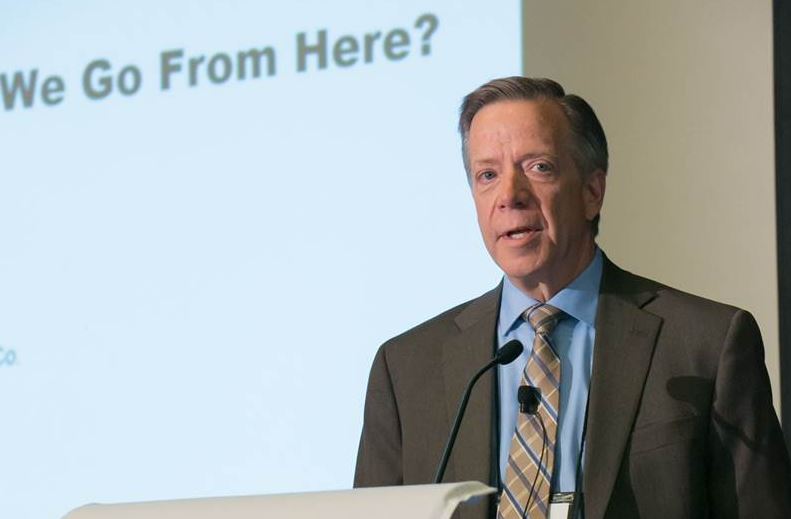Coal Conference presents survival ideas

By Ellsworth Dickson

It must be difficult to be employed by a coal mining company. There have been years of bad news such as massive layoffs, declining coal demand in China and an uncertain future. In addition, many people, particularly environmental groups, view coal as an archaic sunset industry that must be killed off.
This is ironic since, as Brad Johnston, General Manager, Logistics, Coal, Teck Resources Ltd., noted in his talk at the recent Coal Association of Canada Conference in Vancouver, if you want to “go green” you need coal. For example, it took 30,000 tonnes of steelmaking (metallurgical) coal to make the steel rails for Vancouver’s Canada Line Skytrain subway. Of course, it’s good to get people out of cars; however, mass transportation requires lots of steelmaking coal. It also takes about a hundred tonnes of metallurgical coal to make the steel used in a wind turbine.
In fact, modern agriculture could not exist without steelmaking coal as steel is used to make tractors, harvesters and other farm machinery – not to mention the trucks and rail cars that deliver agricultural products to supermarkets.
Teck Resources, Canada’s only producer of steelmaking coal, is the number one steelmaking coal miner in North America and the second largest exporter of steelmaking coal in the world.
Those who know something about coal recognize that it is thermal coal burned in coal-fired power plants that is viewed as the real problem, not metallurgical coal. Many coal-fired plants are now switching to cleaner-burning natural gas, although that’s not good enough for some fossil fuel haters.
As an indicator of what coal companies have been facing, 45% of US coal production, since 2012, has been produced by companies that have filed for bankruptcy. Coal sector employment is down 42% since the peak in Q4 2011. Those coal companies that have survived the downturn are trying to find ways to carry on. What to do?
In his presentation at the conference, Jim Griffin, Managing director of FBR Capital Markets & Co., explained that coal companies will need to creatively seek out all sources of capital. This is due to many institutional investors divesting from fossil fuels as well as major US and international banks refusing to provide debt financing. In other words, traditional sources of new equity are no longer interested in coal as renewable energy technologies evolve and the natural gas industry being more in favour.
Some coal companies are rising to the challenge with production cutbacks, high-grading, employee layoffs, project delays, reduced exploration budgets, CAPEX reductions, dividend reductions and curtailment, finding new equity raising sources, debt renegotiations, assets sales and stock-for-stock survival mergers.
Some of Teck’s business strategies to maintain cash-positive operations include reducing all-in sustaining coal mining costs by increasing truck productivity and lowering maintenance and procurement costs. Teck has reported truck productivity improvements of $145 million in sustainable savings since 2013. Fewer employees have also lowered costs; however, Teck does try to do this by attrition rather than massive layoffs.
For 2016, there is an additional planned reduction of 99 coal employees. The company is targeting an additional savings of over $80 million this year.
Some of Teck’s other money-saving ideas include longer coal trains, improved loadouts as well as reduced bunching and queuing of trains. The success of Teck’s coal mining operations is very important to British Columbia as coal is the province’s most valuable mineral with an annual value of $3.04 billion.
With the Chinese slowdown, coal companies are waiting for India to take its place, although this won’t happen overnight. Meanwhile, coal continues to play an important role in Canada’s economy and contributes $5.2 billion directly and indirectly and accounts for nearly 42,000 jobs. The country currently has 19 coal mines with 25 coal projects currently going through various governmental regulatory processes.
